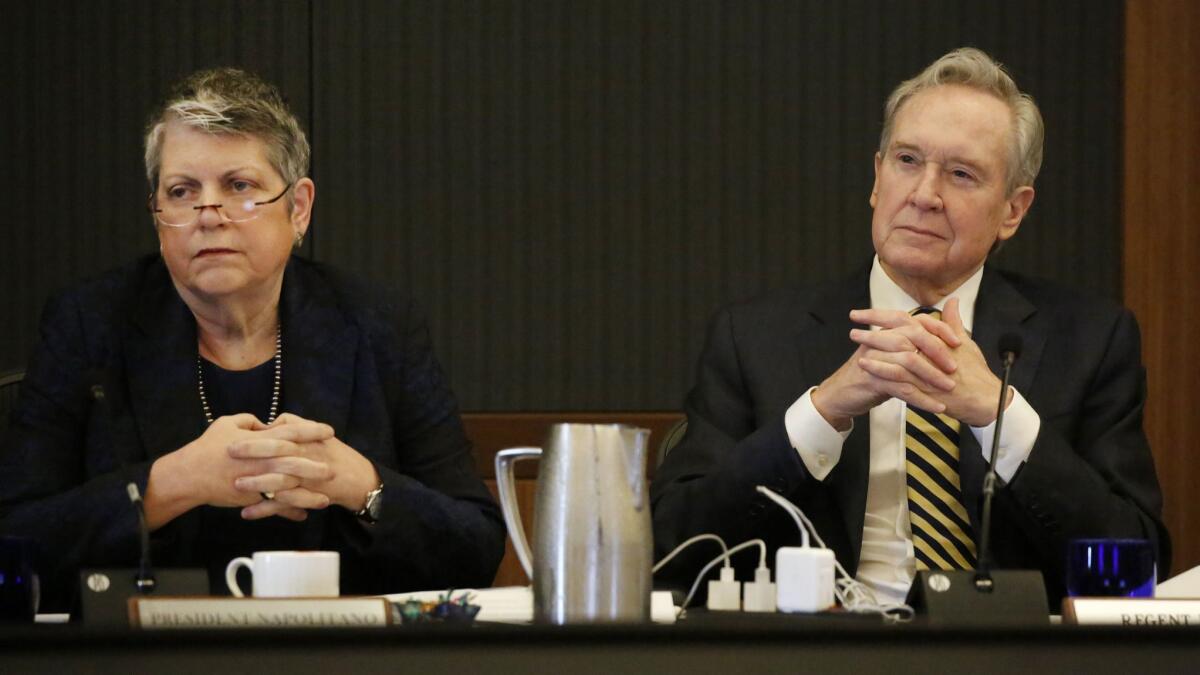UC regents committee approves tuition hike for nonresident students

A University of California regents committee on Wednesday approved a tuition increase for nonresident students, despite their pleas that it would cause them hardship.
The proposed 3.5% tuition increase would boost the supplemental tuition that nonresident students pay by $978 — from $28,014 to $28,992 for the 2018-19 school year. The increase would raise nearly $35 million.
UC officials say nonresident tuition dollars have helped pay for more courses at UCLA, academic support and advising at UC Berkeley and programs to raise graduation rates at UC San Diego.
The full Board of Regents, meeting at UCLA, will vote on the proposal Thursday.
During the public comment session before the full board Wednesday, Ayesha Haleem, a UCLA student from Pakistan, told regents she was fearful of violence in her country in coming to California but now was scared that rising tuition would force her to return. She also said that she and other international students enrich the campus.
“International students are not just cash cows,” said the junior studying political science and international development studies. “The amount of cultural capital we bring from all around the world should be looked upon when the UC makes this decision.”
Other students objected to treating nonresident students differently than Californians since all contribute to their campuses. Rigel Robinson, a UC Berkeley student government leader from Missouri, said many nonresidents — including him — have ties to California and plan to stay here after graduation. His great-grandmother was the first woman to graduate from UC Berkeley’s agricultural college, he said, and his father attended UCLA.
“California has always been my home,” he said.
Two California gubernatorial candidates also spoke about proposed tuition hikes at the meeting Wednesday. State Treasurer John Chiang urged regents to delay action until 2019. Delaine Eastin, a former state superintendent of public instruction, urged regents to challenge the state to reinvest in higher education. Eastin, 70, said she paid only $82.50 a semester in tuition as a UC Davis student. That would be about $650 in today’s dollars.
Eastin and Chiang came to the meeting at the request of UCLA students.
Later, Nathan Brostrom, UC’s chief financial officer, told finance committee members that the Legislature does not favor breaks for nonresident students. The UC system nearly quadrupled the number of nonresident students between 2009 and 2017 — they numbered 37,217 last fall — to replace revenue lost to budget cuts following the 2008 recession.
The growing numbers sparked a political backlash. Legislators ordered a state audit, which found that UC officials had harmed California students by enrolling so many nonresidents — a conclusion that university officials sharply contest. UC officials have eliminated financial aid for nonresident students and placed a cap on their numbers.
“We got treated quite hostilely by legislators on the nonresident issue,” Brostrom said.
The finance committee approved the proposal with little discussion. That prompted students to disrupt the meeting by standing up and chanting, “UC, UC, can you see? We don’t want your tuition fee.”
In other matters, committee members approved multiyear plans for supplemental tuition levels for various graduate and professional degree programs, which the full board will vote on Thursday.
Regents also heard presentations on UC’s efforts to comply with the state auditor’s recommendations by reviewing the salary levels of top executives and improving the budget practices of the office of President Janet Napolitano.
Regents also plan to discuss the UC system’s costs and financial aid programs Thursday.
More to Read
Sign up for Essential California
The most important California stories and recommendations in your inbox every morning.
You may occasionally receive promotional content from the Los Angeles Times.











